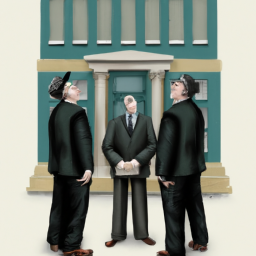This past Monday was Presidents' Day, commemorating the birthday of our first president and Founding Father George Washington. In classrooms across the country, teachers and students alike took a moment to reflect on the legacies of our nation's Founding Fathers and the impact they have had on our nation. Pedro and I, two history teachers in the same school district, discussed the challenge of teaching students about the Founding Fathers and their lasting influence on our nation.
One of the most persistent myths about the Founding Fathers is that they were all deists, meaning that while they believed in the existence of a higher power, they did not believe in the divinity of Jesus Christ or the power of organized religion. While it is true that many of the Founding Fathers, such as Thomas Jefferson and James Madison, were deists, this was not true of all of them. George Washington and John Adams were both devout Christians, and Benjamin Franklin was a Unitarian.
Another common misconception about the Founding Fathers is that they were all wealthy landowners who owned slaves. This is certainly not true: many of the Founding Fathers, such as Alexander Hamilton and James Monroe, were of humble means, and some of them did not own any slaves at all. Moreover, the Founding Fathers were not unanimous in their support for slavery: Thomas Jefferson and James Madison both owned slaves, but they were also vocal opponents of the institution.
The Founding Fathers also faced a great deal of opposition from those who disagreed with their political ideology. For example, many of the Founding Fathers were strong advocates of the concept of “natural rights,” which held that all people were born with certain inalienable rights that could not be taken away. This was a controversial concept at the time, and many opposed it on the grounds that it threatened the power of the monarchy.
The Founding Fathers also believed that our nation should be ruled by the people, and not by a single powerful leader. This concept of “popular sovereignty” was another controversial idea at the time, and it was opposed by those who believed that the authority to rule should remain in the hands of the monarchy. The Founding Fathers argued that the people should have control over their own destiny, and that they should be allowed to choose their own leaders.
The Founding Fathers also had a great deal of influence on our nation's economic policies. They believed that the economy should be based on free trade and the free market, and that taxes should be kept low in order to encourage economic growth. They also argued that the government should not interfere in the economy, but should instead allow the free market to function as it should.
The Founding Fathers were also instrumental in creating our nation's legal system. They believed that laws should be written to protect the rights of citizens and to ensure fairness and justice for all. They also argued for the separation of powers between the executive, legislative, and judicial branches of government, in order to ensure that no one branch would become too powerful.
The Founding Fathers also had a great deal of influence on our nation's foreign policy. They believed that the United States should remain neutral in international disputes and should not become involved in foreign wars. They also argued for the establishment of a strong military to protect our nation's interests, as well as for diplomacy and negotiation as a way to resolve conflicts.
The Founding Fathers also had a great deal of influence on our nation's education system. They believed that education should be accessible to all, regardless of their social status or economic background. They also argued for the establishment of public schools and universities, as well as for the provision of financial aid to those who could not afford to attend college.
The Founding Fathers also had a great deal of influence on our nation's healthcare system. They believed that healthcare should be accessible to all, regardless of their financial situation. They argued for the establishment of hospitals and for the provision of financial assistance to those in need. They also argued for the protection of the rights of patients and for the establishment of regulations to ensure safety and quality of care.
The Founding Fathers also had a great deal of influence on our nation's financial system. They believed that the economy should be based on sound monetary policy, and that the government should not interfere in the financial markets. They also argued for the establishment of regulations to protect the rights of investors and to ensure the stability of the economy.
The Founding Fathers also had a great deal of influence on our nation's immigration policies. They believed that immigration should be regulated, but that it should be done in a way that allowed for the admission of those who could contribute to the nation. They also argued for the establishment of regulations to protect the rights of immigrants and to ensure that they would be treated fairly.
The Founding Fathers also had a great deal of influence on our nation's transportation system. They believed that the government should invest in the construction of roads, bridges, and other infrastructure in order to facilitate commerce and travel. They also argued for the establishment of regulations to ensure the safety of travelers and to protect the environment.
In conclusion, the legacy of the Founding Fathers is still felt today in many aspects of American life. From our laws and our economy to our healthcare and education systems, the ideas of the Founding Fathers have shaped our nation and continue to do so today. On this Presidents' Day, we should all take a moment to reflect on the great contributions of our Founding Fathers and to honor their legacy.
